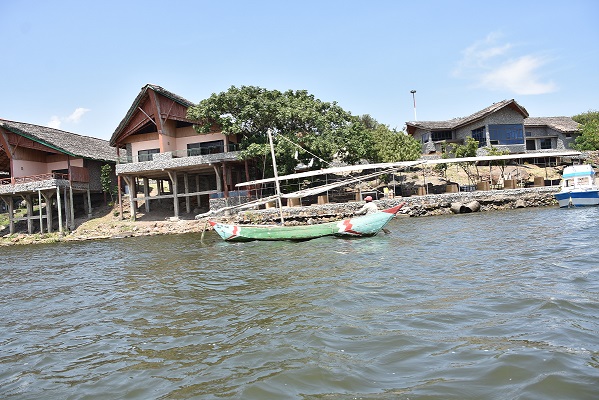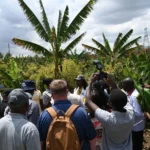By Francis Mureithi – mureithifrancis1964@gmail.com
Investors targeting the Kenyan side of Lake Victoria, the world’s second-largest freshwater lake are at crossroads, faced with a huge potential but negated by plastic pollution and other waste released into the water body.
A boat ride covering 4,100 square kilometres on the Kenyan side exposes a mixture of beautiful sceneries and heavily polluted sections that would turn away any investor.
Environmentalists say about 50 per cent of the total water surface on the Kenyan side of Lake Victoria has more plastic than fish, posing a serious health nightmare to humans and the aquatic life.
Tourism has hence suffered adversely as the lake’s beauty is blocked by increasing pollution.
The growing population around 10 counties that border the lake has put it under constant and increased pressure from mismanaged waste and pollution, threatening livelihoods of more than 11 million fisher folk. Thousands of workers employed directly and indirectly by the collapsing hospitality industry around the lake also face a bleak future as a result of the pollution.
The Blue Economy is expected to boost hospitality industry components such as hotels mushrooming around the shores of the lake and attracting investors in the tourism sector but the opposite is true. Several hotels have reduced their workforce as the number of local and international tourists visiting for water sporting activities like boat riding dwindles.
“Lake Victoria is a big driver of the Blue Economy and counties bordering the lake are supposed to reap maximum benefits but on the face of the many challenges facing the lake including heavy pollution, few tourists are booking our hotels. Unless there is massive cleanup of the lake, very soon we shall be forced to close down,” says Joshua Okoth, a manager at one of the hotels in Kisumu City.
He adds: “Before the contamination reached its fever pitch, our hotels would be adequately booked, especially during weekends. That is now a pipe dream. We struggle to get half the number of clients we used to get, thanks to the increasing pollution of Lake Victoria which goes on under the watch of authorities responsible for safeguarding the lake.”
According to environmental activists in Kisumu, despite concerted awareness campaigns on pollution, the fishing community and rogue companies dump more than 12 tonnes of plastic waste in the lake annually. This includes untreated sewage from the city and overflowing latrines that contaminate the lake.
Plastic and raw sewage is not the only threat to the lake. Agriculture and industrialisation also play a key role in turning the lake from a source of livelihood to a deep-end septic tank as effluent and fertilisers are washed into the water body.

The poor sanitation and limited waste management around the lake have led to the overflow of harmful pollutants into the water basin causing massive death of fish.
“The Blue Economy is supposed to be the saviour as the sugar industry has collapsed due to pollution. Many of the beaches are an eye sore. They are dirty. No tourist wants to visit a dirty place,” says another investor in the hospitality industry.
The largely neglected sector rakes in billions from fishing and tourism by local and foreign visitors.
Dr Christopher Aura, the Director in charge of fresh water research at Kenya Marine Fisheries Research Institute (KMFRI) in Kisumu says fishers need to embrace best fishing practices to reduce pressure on the lake.
He says the lake produces 115 tonnes of fish annually valued at Sh12 billion ex-vessel (without trade involvement) yet it has potential for 300 tonnes.
The effect of pollution is visible with many who had invested in cage fishing abandoning the venture.
“I had invested my retirement benefits by building a fish cage but pollution has messed me up and all my Sh300,000 has gone down the drain,” said Mr Paul Obunga.
Some of the eateries at Dunga Beach have closed shop due to dwindling fish stocks. “The mama samakis who work on the shoreline have lost their jobs,” said Salim Abdallah, the vice-chairman of Kichinjio Beach Management Unit.
Taxi drivers who used to drop clients to the beach have also moved further away as traffic to the beach reduces and clients or number of trips dwindle.
Robinson Anyal, the Lake Victoria Tourism Association chairperson says: “We don’t support operators who interfere with the conservation of the lake. Those operators should be denied operating licenses.”
National Environment Management Authority (NEMA) Kisumu County Director Leonard Ofula says the biggest challenge is identifying firms that discharge untreated waste into the lake without passing the pre-treatment process at (KIWASCO). “We have arrested many suspects and taken them to court to deter them from such behavior,” he says.
He adds that KIWASCO has stopped private developers from encroaching the lake shoreline and we are monitoring activities round the clock.”
There is however hope that Lake Victoria, the Jewel of East Africa, a key tourism attraction with its scenic beauty and islands can be rehabilitated and made more attractive to tourists and investors in the sector.
The lake has large tracts of wildlife reserves and is well-known for up to 39 key biodiversity areas of interest including iconic parks forests and savannas of the basin. The lake is home to a diverse range of flora and fauna including numerous endemic species of fish making it a biodiversity hotspot in the region.









